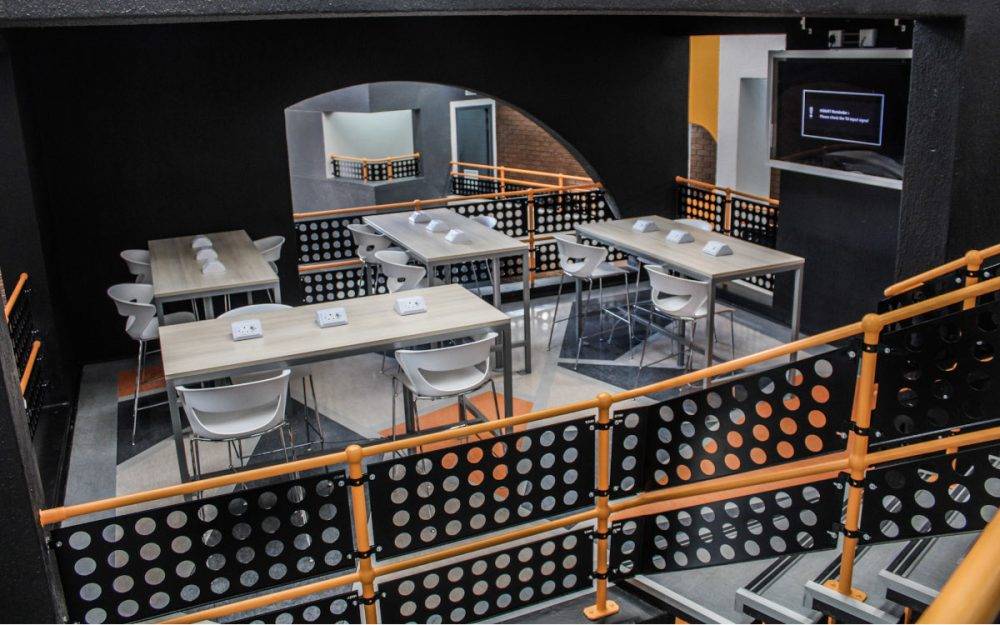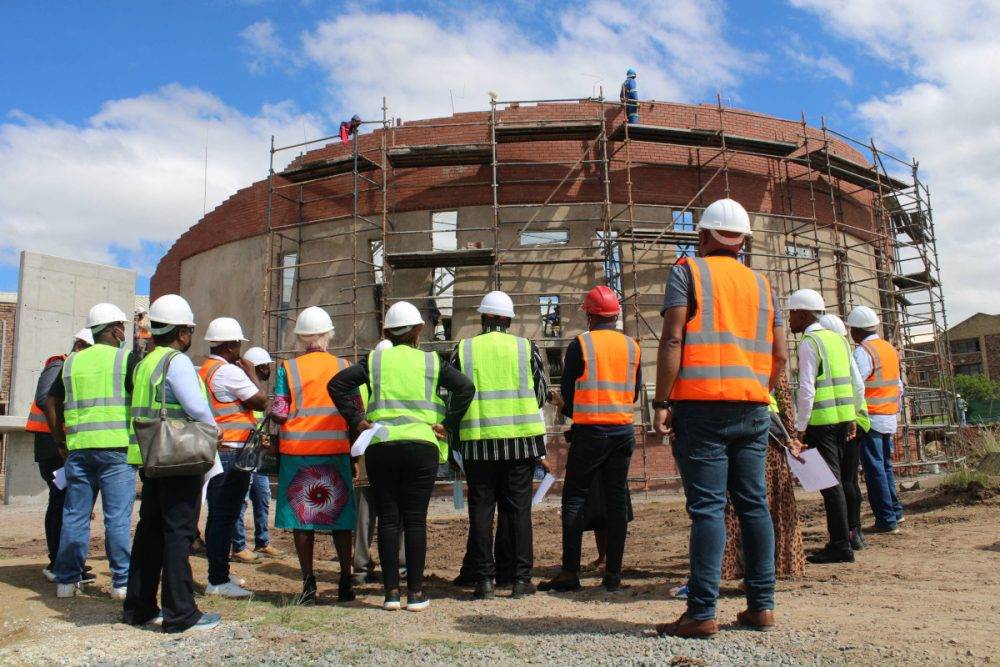Professor Rushiella Songca has made significant changes since she took office as Vice-Chancellor of Walter Sisulu University in 2021.
Her 10-year strategic plan is guiding the university’s transformation
When Professor Rushiella Songca took office as Vice-Chancellor of Walter Sisulu University (WSU) in April 2021, she faced a daunting landscape. As the sixth leader and first female to helm WSU, Prof Songca inherited an institution grappling with numerous challenges.
The university was plagued by student protests, accreditation concerns, crumbling infrastructure, and low staff morale. It was clear that immediate and decisive action was needed to turn the tide.
“Change was not just necessary; it was urgent,” Prof Songca stated in a recent interview. Her response was swift and comprehensive, launching the ambitious WSU Vision 2030, a 10-year strategic plan to guide the university’s transformation.
Central to this vision was the Rationalisation and Consolidation (R&C) project, which aimed to unify the institution that had been struggling with its identity since the 2005 merger of three separate entities. The university was characterised by high levels of geographical (in terms of campuses) and academic fragmentation and replication which were undoubtedly reflected in management and governance structures. Neither the academic nor financial features of this configuration were sustainable. Under Prof Songca’s leadership, WSU has finally become a unitary institution, with rationalised faculties from 12 to seven and harmonised staff benefits, a process that had been stalled since 2011. The university continues in nurturing campus identities based on academic strengths, ensuring uniform support provision, enhancing faculties and infrastructure, and equitably distributing workloads and resources.
There was also an urgent need to address allegations of the university offering non accredited programmes. Following these allegations, Prof Songca initiated an internal audit and worked closely with regulatory bodies. The Council on Higher Education (CHE) also completed a comprehensive audit of WSU programmes and confirmed that WSU’s programmes were indeed accredited, putting to rest allegations that had caused unrest. WSU continues to work closely with its regulatory bodies and accreditation partners to ensure that the university offers fully compliant qualifications that equip graduates with future ready skills and competencies. All WSU qualifications on offer remain fully Department of Higher Education and Training (DHET) approved, CHE accredited and registered with South African Qualifications Authority (SAQA) on the South African National Qualifications Framework (NQF).
At the heart of WSU’s Vision 2030 also lies a transformative infrastructure initiative. When Prof Songca assumed leadership, she inherited a university beset by deteriorating facilities and a track record of underutilized development grants. Recognising the critical nature of this challenge, she swiftly engaged with the DHET, presenting a comprehensive and actionable plan for infrastructure revitalization.
The subsequent turnaround has been nothing short of remarkable. Once languishing among the poorest performers in grant utilisation, WSU has emerged as a beacon of efficient infrastructure development. From April 2021 to November 2023, the university soared to become the second-highest spender on infrastructure projects nationwide, a testament to Prof Songca’s strategic vision and execution.
This surge in investment resulting from DHET’s and WSU Council’s support through the infrastructure grants including the Infrastructure Efficiency Grants (IEG) and Sibusiso Bhengu Development Grant (SB-DG) as well as Council Controlled Projects, has yielded tangible, far-reaching results, including renovated teaching and learning facilities and students’ residences and construction of new buildings, for example:
Renovated facilities:
- At the Nelson Mandela Drive campus in Mthatha, the East Teaching Malls have been fully renovated, while both the KTC and KGB Residences have been upgraded.
- The Ibika campus in Butterworth has seen extensive refurbishment of its student residences.
- In East London, the old Potsdam student residence has been thoroughly refurbished.
 WSU residences have all the requirements for today’s student learning experience.
WSU residences have all the requirements for today’s student learning experience.
New buildings:
- A state-of-the-art IT Hub has been constructed at the Zamukulungisa campus in Mthatha.
- The Faculty of Education at the Ibika Potsdam campus now boasts new lecture venues.
These comprehensive refurbishments and new constructions have transformed the university environment. Students and staff now experience a campus atmosphere that reflects an institution where infrastructure development is a top priority. According to Prof Songca: “These improvements are not just about bricks and mortar. They represent our commitment to providing a world-class learning environment that inspires our students and staff to achieve excellence in line with WSUs slogan”.
The digital transformation of WSU has been equally impressive. Since 2021, the Registrar’s Division implemented Walter Sisulu University’s digital revolution, which has catapulted the institution into the modern era of higher education with a suite of cutting-edge systems that have streamlined operations across the board.
“Our goal was to create a seamless digital ecosystem that serves all our stakeholders,” explains Prof Songca. “From prospective students to alumni, we wanted to enhance every touchpoint with the university.”
According to Prof Songca, the transformation begins at the admissions stage, where a new academic application ranking system, coupled with an advanced management platform, has revolutionised the selection process. This innovation ensures a more transparent and efficient evaluation of applicants, upholding fairness and timeliness in admissions decisions.
Once enrolled, students and staff alike benefit from a state-of-the-art Lecturer Learning Management System. This platform has redefined the teaching and learning experience, facilitating dynamic interaction between educators and learners.
Perhaps the most visible change on campus is the introduction of smart classrooms. These tech-enabled spaces blend cutting-edge technology with traditional teaching methods, offering lecturers powerful tools for engaging content delivery and real-time student interaction. For students, these classrooms provide an immersive learning environment that fosters collaboration, critical thinking, and digital literacy – skills crucial for success in today’s workplace.
“We’re not just preparing students for exams,” Prof Songca emphasises. “We’re equipping them with the digital fluency and collaborative skills that employers demand in the 21st century.”
It is also imperative to note that the digital overhaul extends beyond the classroom, with new systems for alumni management and graduate identification keeping WSU connected with its ever-growing network of successful alumni.
The university’s commitment to this digital revolution also extends beyond implementation. “Our focus now is on ensuring that every member of our university community can harness the full potential of these new systems,” Prof Songca explains. To this end, WSU has launched comprehensive training programs, empowering staff and students to make optimal use of the new digital tools at their disposal. Complementing these efforts, the university has invested in widespread Wi-Fi installation across teaching and learning spaces as well as student residences in some campuses, ensuring seamless connectivity and access to digital resources.
Reflecting on the journey, Prof Songca notes: “When I took on leadership during the Covid-19 pandemic, we faced immense challenges. But we also saw opportunities, particularly in accelerating our digitalisation agenda.” This forward-thinking approach has paid dividends, modernising administrative processes, improving operational efficiency, and significantly enhancing the overall academic experience for both students and staff.
Prof Songca also found a neglected student life agenda. Years of neglect had led to escalating cases of gender-based violence (GBV), frequent and disruptive student protests and a general sense of disconnect between the student body and the university management.
“We realised that academic excellence alone wasn’t enough,” Prof Songca explains. “We needed to create a nurturing environment where students could thrive both intellectually and personally.”
 WSU has emerged as a beacon of efficient infrastructure development. A state-of-the-art IT Hub has been built at the Zamukulungisa campus in Mthatha.
WSU has emerged as a beacon of efficient infrastructure development. A state-of-the-art IT Hub has been built at the Zamukulungisa campus in Mthatha.
To address these challenges, a series of innovative initiatives were introduced. Chief among these was the WSU Brand Ambassadors initiative, a team of peer leaders tasked with tackling critical issues like GBV and mental health.
“Our Student Ambassadors are the bridge between the administration and the student body,” says Prof Songca. “They’re not just representatives; they’re change-makers.” One of the initiative’s most significant achievements has been the development of a “MySafeSpace” web application in collaboration with the Information and Communication Technology (ICT) directorate. This technology-driven web application was launched this year and is utilised as a secure and protected environment for students to address an array of social challenges that include GBV, bullying, harassment, and mental health concerns amongst others. The web application has since been extended to also include a staff component for reporting of GBV and harassment cases.
Alongside these safety measures, the university has launched comprehensive awareness campaigns. These efforts have yielded tangible results, with a noticeable decline in student unrest and a more positive campus atmosphere.
But the transformation of student life at WSU goes beyond safety and wellbeing. Prof Songca’s administration has also focused on enriching the academic experience outside the classroom. Research initiatives have been significantly bolstered, with the introduction of competitions like FameLab and the Hult Prize, among others. Our school of law students participated in the Christof Heyns African Human Rights Moot Court Competition for the first time this year and made it to the top 10 amongst the English teams and ranked number 16 amongst 87 participating universities around the African continent.
“These competitions challenge our students to think beyond their disciplines,” Prof Songca notes. “They’re learning to apply their knowledge to real-world problems, often on a global stage.”
Perhaps the most ambitious of these initiatives is the Multi-Inter-Trans-Disciplinary Conference (MITC). This annual WSU conference brings together staff and students from various fields, fostering collaboration and cross-pollination of ideas.
“The MITC is more than just a conference,” Prof Songca enthuses. “It’s a melting pot of ideas, where students and staff across the globe can explore the intersections of different disciplines. This is where innovation and collaborations happen.”
The results of these initiatives have been profound. Student life, once an afterthought, now stands as a central pillar of the university’s mission. This shift has yielded impressive results: student engagement has markedly improved, disciplinary issues have decreased and academic performance is on an upward trajectory. Perhaps most significantly, a palpable sense of pride and belonging has taken root among the student body.
“We’re not just educating students,” Prof Songca asserts. “We’re nurturing future leaders, innovators, and responsible citizens. That’s the true measure of a university’s success.”
Yet, amid these triumphs, Prof Songca remains clear-eyed about the challenges ahead. “We’re still grappling with the cultural shifts necessary for full integration,” she acknowledges. However, the progress is undeniable, particularly in the realm of academic staff development.
The numbers tell a compelling story. PhD holders among staff have surged from 199 in 2022 to 220 in 2023, with further increases anticipated. Master’s-qualified staff have also seen a significant boost, rising from 301 in 2021 to 360 at present.
Perhaps most impressively, WSU’s research profile has skyrocketed. NRF-rated researchers have increased more than tenfold, from a mere three in 2019 to an impressive 38 today. This trajectory speaks volumes about the university’s growing research appetite and academic rigour.
“These figures are not just statistics,” Prof Songca stresses. “They represent a fundamental shift in our academic culture. Our staff are pushing boundaries, engaging in cutting edge research and bringing that knowledge directly in their teaching spaces.”
As WSU continues to evolve, it is clear that the university is not just changing, it is being reborn. From the academic programmes offered, infrastructural developments, their digitalization initiative and student life to academic excellence, every facet of the institution bears the hallmarks of a university on the rise. While challenges remain, the trajectory is unmistakable.